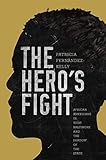The Hero's Fight : African Americans in West Baltimore and the Shadow of the State / Patricia Fernández-Kelly.
Material type: TextPublisher: Princeton, NJ : Princeton University Press, [2016]Copyright date: ©2015Description: 1 online resource : 10 line illus. 2 tablesContent type:
TextPublisher: Princeton, NJ : Princeton University Press, [2016]Copyright date: ©2015Description: 1 online resource : 10 line illus. 2 tablesContent type: - 9780691173054
- 9781400883561
- 362.50896073 23
- HV4046.B35 .F476 2015eb
- online - DeGruyter
- Issued also in print.
| Item type | Current library | Call number | URL | Status | Notes | Barcode | |
|---|---|---|---|---|---|---|---|
 eBook
eBook
|
Biblioteca "Angelicum" Pont. Univ. S.Tommaso d'Aquino Nuvola online | online - DeGruyter (Browse shelf(Opens below)) | Online access | Not for loan (Accesso limitato) | Accesso per gli utenti autorizzati / Access for authorized users | (dgr)9781400883561 |
Frontmatter -- CONTENTS -- Preface to the Paperback Edition -- Acknowledgments -- Introduction -- 1. D. B. Wilson -- 2. Baltimore: From Factory Town to City in Decline -- 3. Big Floyd -- 4. Intersections of Poverty, Race, and Gender in the American Ghetto -- 5. Shaping the Inner City: Urban Development and the American State -- 6. Distorted Engagement and Liminal Institutions: Ruling against the Poor -- 7. Little Floyd -- 8. Down the Rabbit Hole: Childhood Agency and the Problem of Liminality -- 9. Clarise -- 10. Paradoxes of Social Capital: Constructing Meaning, Recasting Culture -- 11. Towanda -- 12. Cultural Capital and the Transition to Adulthood in the Urban Ghetto -- 13. Lydia -- 14. Faith and Circumstance in West Baltimore -- 15. Manny Man -- 16. Divided Entrepreneurship and Neighborhood Effects -- Conclusion: Distorted Engagement and the Great Ideological Divide -- Appendix -- Notes -- Bibliography -- Index
Baltimore was once a vibrant manufacturing town, but today, with factory closings and steady job loss since the 1970s, it is home to some of the most impoverished neighborhoods in America. The Hero's Fight provides an intimate look at the effects of deindustrialization on the lives of Baltimore's urban poor, and sheds critical light on the unintended consequences of welfare policy on our most vulnerable communities.Drawing on her own uniquely immersive brand of fieldwork, conducted over the course of a decade in the neighborhoods of West Baltimore, Patricia Fernández-Kelly tells the stories of people like D. B. Wilson, Big Floyd, Towanda, and others whom the American welfare state treats with a mixture of contempt and pity-what Fernández-Kelly calls "ambivalent benevolence." She shows how growing up poor in the richest nation in the world involves daily interactions with agents of the state, an experience that differs significantly from that of more affluent populations. While ordinary Americans are treated as citizens and consumers, deprived and racially segregated populations are seen as objects of surveillance, containment, and punishment. Fernández-Kelly provides new insights into such topics as globalization and its effects on industrial decline and employment, the changing meanings of masculinity and femininity among the poor, social and cultural capital in poor neighborhoods, and the unique roles played by religion and entrepreneurship in destitute communities.Blending compelling portraits with in-depth scholarly analysis, The Hero's Fight explores how the welfare state contributes to the perpetuation of urban poverty in America.
Issued also in print.
Mode of access: Internet via World Wide Web.
In English.
Description based on online resource; title from PDF title page (publisher's Web site, viewed 20. Jun 2019)


